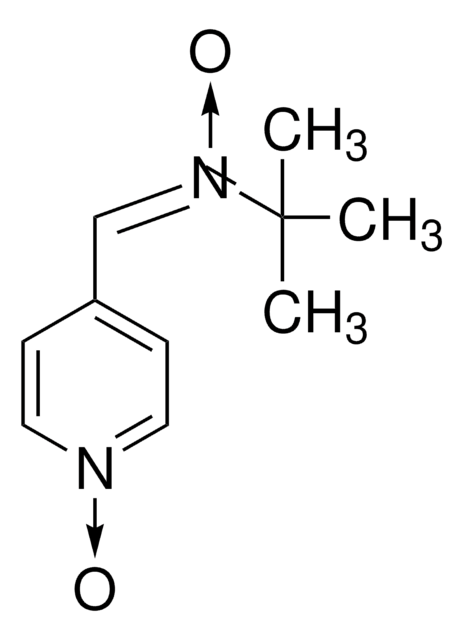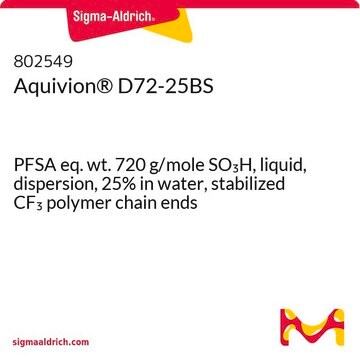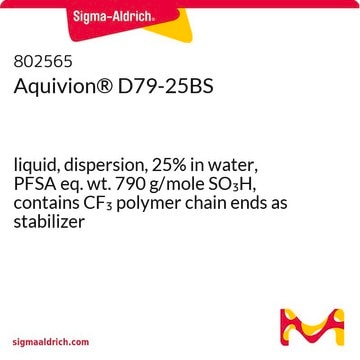All Photos(1)
About This Item
Empirical Formula (Hill Notation):
C8H15NO
CAS Number:
Molecular Weight:
141.21
MDL number:
UNSPSC Code:
12352100
PubChem Substance ID:
NACRES:
NA.22
Recommended Products
assay
95%
form
solid
bp
73 °C/1 mmHg (lit.)
mp
58-61 °C (lit.)
storage temp.
−20°C
SMILES string
CC1(C)CC(C)(C)[N+]([O-])=C1
InChI
1S/C8H15NO/c1-7(2)5-8(3,4)9(10)6-7/h6H,5H2,1-4H3
InChI key
GUQARRULARNYQZ-UHFFFAOYSA-N
General description
The ESR spectrum of 3,3,5,5-tetramethyl-1-pyrroline N-oxide was studied.
Application
3,3,5,5-Tetramethyl-1-pyrroline N-oxide was used as a spin traping reagent.
Storage Class
11 - Combustible Solids
wgk_germany
WGK 3
flash_point_f
Not applicable
flash_point_c
Not applicable
ppe
Eyeshields, Gloves, type N95 (US)
Certificates of Analysis (COA)
Search for Certificates of Analysis (COA) by entering the products Lot/Batch Number. Lot and Batch Numbers can be found on a product’s label following the words ‘Lot’ or ‘Batch’.
Already Own This Product?
Find documentation for the products that you have recently purchased in the Document Library.
Shing-Jong Huang et al.
Solid state nuclear magnetic resonance, 29(4), 272-277 (2005-11-09)
We show that a Gaussian-shaped pulse can be used to excite selected 1H signals in hydroxyapatite, monetite and H-Y zeolite loaded with trimethylphosphine oxide (TMPO). This selective excitation method can be incorporated into Lee-Goldburg (LG) cross-polarization to obtain useful spectral
D De Bono et al.
Free radical research, 20(5), 327-332 (1994-05-01)
The hydroxyl radical adducts of 5,5 dimethyl-1-pyrolline-N-oxide (DMPO) and 3,3,5,5 tetramethyl-1-pyrolline-N-oxide (TMPO) formed in the presence of hydrogen peroxide and FeII are normally quite stable, but in the presence of 5-20 micromolar myoglobin their ESR signals decay rapidly. This decay
J F Torres-Roca et al.
Journal of immunology (Baltimore, Md. : 1950), 165(9), 4822-4830 (2000-10-25)
The roles of oxygen and reactive oxygen intermediates in apoptosis are unclear at present. Although oxygen and reactive oxygen intermediates are not required for the execution of apoptosis, oxygen may be involved in at least some forms of apoptosis. In
M J Davies et al.
The Biochemical journal, 240(3), 789-795 (1986-12-15)
Spin trapping using 5,5-dimethyl-1-pyrroline N-oxide (DMPO) has been used to detect and distinguish between the carbon-centred, alkoxyl, and peroxyl radicals produced during the photolytic decomposition of hydroperoxides. Photolysis of tert-butyl and cumene hydroperoxides, and peroxidized fatty acids, in toluene, with
E G Janzen et al.
Journal of biochemical and biophysical methods, 30(4), 239-247 (1995-11-01)
To obtain the strongest possible free radical spin adduct signal using the electron paramagnetic resonance spectroscopy-spin trapping technique, it is desirable to load an animal with the highest dose of spin trap possible. One hundred and twenty six male Sprague-Dawley
Our team of scientists has experience in all areas of research including Life Science, Material Science, Chemical Synthesis, Chromatography, Analytical and many others.
Contact Technical Service








